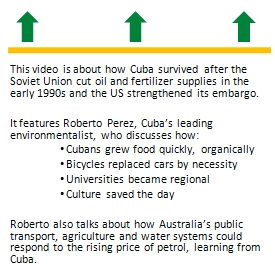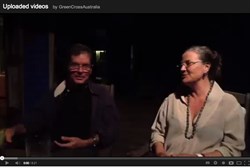

International work
Food for Thought - Cuba

Food security
Building resilience to shocks and stresses in food supply
The collapse of the Soviet Union had an unpredictable result: Cuba survived a real world peak oil shock, providing a valuable example of how other communities around the world can respond to scarce and expensive petrol. In the early 1990s's Cuban oil imports were cut in half and food imports dropped by 80% when the Soviet Union cut aid and the US tightened its trade embargo.
A prize winning US film called "The Power of Community" documents how Cuba survived peak oil by growing veggies on the rooftops of Havana, by downsizing farms into smaller private lots, by importing 250,000 Chinese bicycles, and by mobilising the entire culture around a huge national challenge.
This story is full of hope for community resilience. Cuban Environmentalist Roberto Perez was in Brisbane in 2008 and spoke to Green Cross Australia's CEO Mara Bun about the inspiring account of the survival of Cuban food and culture, through the Cuban food crisis. Watch the video to the right of this page to learn more about this amazing story of Cuban adaptation and community resilience.
If you are inspired by how Cubans learned to grow and share rooftop veggies, then consider Premier Campbell Newman's plea to Brisbane residents (back when he was Brisbane Lord Mayor) to grow their own vegetables.
CSIRO's Stefan Hajkowicz has identified food security and an important 21st century challenge through his " Megatrends" framework of global trends that will shape the way we live. High food prices, drought/flood and natural disaster shocks will all impact on our capacity to feed the world, including vulnerable populations in developing countries and indeed Australia.
In 2011 the G20 identified food security with an "ACTION PLAN ON FOOD PRICE VOLATILITY AND AGRICULTURE". G20 nations state:
"We recall the importance of building resilience of societies, enhancing food supply capacities, in order to prepare for and respond to the impact of climate change and possible natural disasters, such as droughts and floods, earthquakes and tsunamis. In this regard, all measures should take into account the particular farmers' constraints.
Specific attention should also be given to improving the quality and diversity of agricultural production and to developing a nutrition sensitive agricultural policy in all parts of the world in order to ensure access to nutritious food."
Australia has much to learn from Cuba in relation to how family and small scale farming can build community resilience, reduce the pressure of high food prices, and cultivate alternative sources of local food supply when natural disasters hit major population centres.
Our friends at Food Connect in Brisbane (and other capital cities) understand this - they connect local sustainable farmers to local customers to build regional food security, and we celebrate their contribution.
Other Cuban innovations driving resilience
The video below addresses how Cuba is building property resilience using local materials to develop new forms of low carbon, hurricane resistant cement. This is another example of how resilient responses offer localised market development opportunities with community benefits.
A conversation with UN Habitat award winning Cuban engineering inspiration Fernando Martirena
_______________________________________________________
Copyright © Green Cross Australia | Terms & Conditions | Privacy Policy
web design brisbane :: (zero)seven

